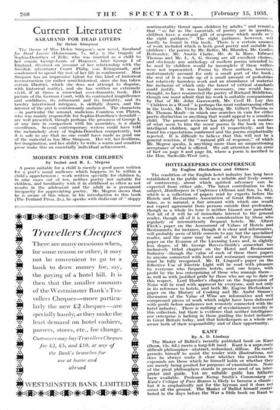MODERN POEMS FOR CHILDREN By Isabel and R. L. Megroz
- A poem suitable for a child is merely a good poem written for a poet's usual audience which happens to be within a child's apprehension ; work written specially for children is, in nine cases out of ten, neither poetry nor suitable for children, and familiarity with it in childhood as often as not results in the adolescent and the adult in a permanent incapacity for appreciating poetry. Mr. Megroz shows that he is aware of this when, in his introduction to this book (The Fenland Press, 2s.), he speaks with disfavour of " sloppy sentimentality thrust upon children by adults" and remarks that "so far as the• essentials of poetry are in question, children have a natural gift of response which needs or), the right guidance." The right guidance, however, will hardly be found in this book. There is a certain amount of work included which is both good poetry and suitable for children: the poems by Mr. Belloc, Mr. Blunden, Mr. Gordon Bottomley, Mr. Austin Clarke, Mr. de la Mare, Edward Thomas and Mr. L. A. G. Strong are all excellent choices, and obviously any anthology of modern poems intended.; to be read by children would be incomplete if these writers were not represented. Poems by these authors, however, unfortunately account for only a small part of the book; the rest of it is made up of a small amount of pedestrian but relatively harmless work and an abundance of material the inclusion of which only the laxest of critical standards could justify. It was hardly necessary, one would have thought, to have resurrected the poetry of Richard Middleton, though one must admit that his work is suitably companioned by that of Mr. John Gawsworth, Mr. Cecil H. Lay (his
Children in a Wood " is perhaps the most embarrassing effort in the book), Mr. Victor B. Neuburg, Mr. Gilbert Thomas or Mr. Thomas Moult—in which one searches in vain for either poetic distinction or anything that would appeal to a sensitive child. The present reviewer has already tested a number of what seem to him the worst poems in the book on two intelligent children, aged 10 and 11 respectively, and has found his expectations confirmed and the poems emphatically rejected. It is difficult to believe that this will not be a general reaction, if the "natural gift of response," of which Mr. Megroz speaks, is anything more than an unquestioning acceptance of what is offered. We call attention to an error of fact on page 8 and page 84, where a poem is ascribed to the Hon. Sackville-West (sic).










































 Previous page
Previous page